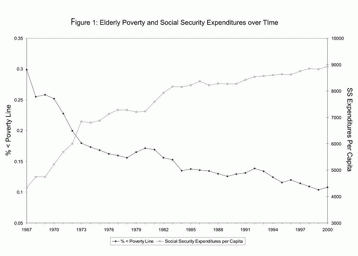Elderly poverty in the U.S. decreased dramatically during the twentieth century. Between 1960 and 1995, the official poverty rate of those aged 65 and above fell from 35 percent to 10 percent, and research has documented similarly steep declines dating back to at least 1939. While poverty was once far more prevalent among the elderly than among other age groups, today's elderly have a poverty rate similar to that of working-age adults and much lower than that of children.
Social Security is often mentioned as a likely contributor to the decline in elderly poverty. Enacted in 1935, the Social Security system experienced rapid benefit growth in the post-WWII era. In fact, there is a striking association between the rise in Social Security expenditures per capita and the decline in elderly poverty, as Figure 1 illustrates (with both series scaled to fit on the same figure).

Social Security vs. Poverty Rate over time
(Image by National Bureau of Economic Research) Details DMCA
See the full report here: http://www.nber.org/bah/summer04/w10466.html
Social Security works. It does what it was designed to do, and although this was not the concern when it was set up, it actually boosts the national output above what it distributes. It is a win-win-win.
Of course, from an economic standpoint, a separate issue is whether a truly sovereign government ought to borrow its own currency at all. This gets into whether we want to support a growing (in wealth) class of idle rent-seekers, both at home and abroad. At home, the issue becomes whether these institutions that seek rent of our money to us, actually put more back into the economy than they take out. This is the banking sector and institutional bond buyers. Well, though some of these bond buyers are funds that do support pensioners, who, like Social Security recipients, spend more into the economy than they take out, there are more direct ways to do this, like Social Security.
How about this? We stop borrowing our sovereign money, eliminate the deadweight Social Security payroll tax altogether, which is 12.4% (half employee, half employer, typically), and simply fund social security payouts directly with debt-free money. Since we would be now saving money by cutting out bond-buying middlemen and paying interest payments to banks, and since we know seniors' demand for goods and services produces more national income than it takes out (see above), why not give seniors a raise while we're at it? The cost of living for that group has consistently outpaced general inflation and payments have not kept up.
While we should never spend all our dollars on any particular group, a dollar spent on seniors seems like a remarkably good deal and should be funded with debt/interest-free sovereign money.
(Note: You can view every article as one long page if you sign up as an Advocate Member, or higher).





